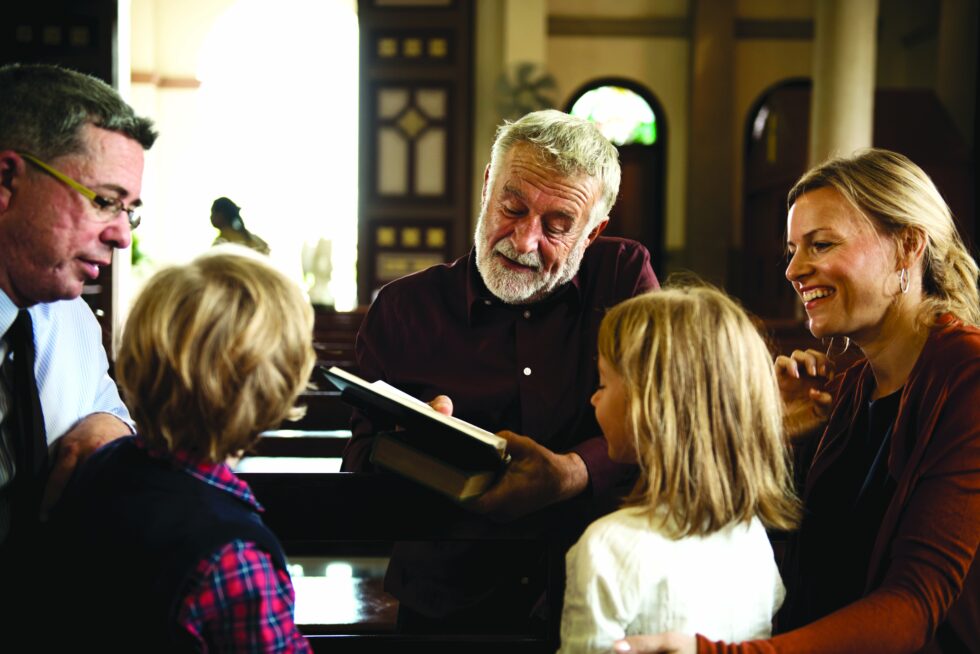
By Gina Teeple
Director of Development & Ministry Relations
- Frank has always been good at anticipating difficulties and finding solutions. He has put this gift to good use by serving on boards and committees for years at his church. However, it has been difficult hearing what is being said at the meetings lately. He was also told by his doctor that he should limit his driving at night, which is when most of the meetings happen.
- Mary has served on the altar guild for as long as she can remember. She loves preparing for worship. Unfortunately, her arthritis has gotten worse, making it difficult to navigate the steps to the altar and prepare for communion.
Perhaps you are in a similar situation.
Perhaps you, like Frank and Mary, can no longer serve the same way that you have faithfully done for so many years. Perhaps, you find yourself questioning whether God can still use you.
I have good news. The answer is a resounding YES!
Scripture tells us, “For we are his workmanship, created in Christ Jesus for good works, which God prepared beforehand, that we should walk in them” (Ephesians 2:10 ESV). Not only has God given each of us work to do; He has uniquely created us for that work!
To better understand how this is true at every stage of life, we are going to talk about vocation. When people hear the word “vocation,” they often think of what someone does to earn a living. In Martin Luther’s time, the word was only used to describe church-related callings (for example, monks, priests, and nuns) because these positions were considered holier than others. However, Luther used the word “vocation” for any calling a Christian might fulfill, including the relationships God has placed us in—child, parent, spouse, sibling, friend, neighbor, coworker, etc.
According to Luther, all of these vocations are holy because God works in and through them to love and care for us. For example, in the Lord’s Prayer, we pray for God to give us our daily bread. How does God provide this daily bread? He provides it through the farmer who grows the wheat, the bakery that bakes it, the delivery truck driver that brings it to the grocery store, and the worker who places it on the shelf.
What does this mean? It means God is at work in everyone, everywhere, always. It means God is at work in YOU. More specifically, God is loving your neighbor through YOU. God is providing for your neighbor through YOU.
You may be wondering—who are my neighbors? This is the beautiful part! Your vocation brings your neighbors into your life: your family, friends, fellow congregation members, your actual next-door neighbor, the neighbor down the street ... even the stranger in line at the grocery store.
You may also be wondering—how do I love my neighbor? If your neighbors are those God has placed closest to you, you don’t have to worry about whether you should be doing something else, somewhere else, for someone else. Instead, Jesus reminds us in the Gospel of Matthew to do what is in front of us today. He tells His disciples, “Therefore do not be anxious about tomorrow, for tomorrow will be anxious for itself. Sufficient for the day is its own trouble” (6:34 ESV).
Sometimes doing what is in front of us involves something big. Most of the time loving our neighbor is an accumulation of small things, though. Mother Theresa noted that while “not all of us can do great things, we can do small things with great love.” She encouraged people to “always meet each other with a smile, for the smile is the beginning of love.”
Something as simple as a smile can remind someone they are loved and not alone. It is important to remember that we show our love for God when we love and care for our neighbor. In the Gospel of Matthew, Jesus says:
“For I was hungry and you gave me food, I was thirsty and you gave me drink, I was a stranger and you welcomed me, I was naked and you clothed me, I was sick and you visited me, I was in prison and you came to me.’
“Then the righteous will answer him, saying, ‘Lord, when did we see you hungry and feed you, or thirsty and give you drink? And when did we see you a stranger and welcome you, or naked and clothe you? And when did we see you sick or in prison and visit you?’
“And the King will answer them, ‘Truly, I say to you, as you did it to one of the least of these my brothers, you did it to me” (25:35-40 ESV).
If the thought of serving God and others differently than you have in the past makes you nervous, remember you are not alone. God is with you! Jesus tells His disciples (and us) in the Gospel of John, “I will ask the Father, and he will give you another Helper, to be with you forever, even the Spirit of truth, whom the world cannot receive, because it neither sees him nor knows him. You know him, for he dwells with you and will be in you” (14:16-17 ESV).
Additionally, God has placed people in your life to help you. We read in Ecclesiastes:
“Two are better than one, because they have a good reward for their toil. For if they fall, one will lift up his fellow. But woe to him who is alone when he falls and has not another to lift him up!
“Again, if two lie together, they keep warm, but how can one keep warm alone?
“And though a man might prevail against one who is alone, two will withstand him—a threefold cord is not quickly broken” (4:9-12 ESV).
Instead of looking back at what you used to do, I encourage you to look at who God has placed in front of you today. Even as your abilities and relationships change, your purpose and calling remain the same—to share the love of Christ with those God has placed in your life!
Hark, the Voice of Jesus Crying
LSB Hymn 826
1
Hark, the voice of Jesus crying,
“Who will go and work today?
Fields are white and harvests waiting—
Who will bear the sheaves away?”
Loud and long the Master calleth;
Rich reward He offers thee.
Who will answer, gladly saying,
“Here am I, send me, send me”?
2
If you cannot speak like angels,
If you cannot preach like Paul,
You can tell the love of Jesus,
You can say He died for all.
If you cannot rouse the wicked
With the judgment’s dread alarms,
You can lead the little children
To the Savior’s waiting arms.
3
If you cannot be a watchman,
Standing high on Zion’s wall,
Pointing out the path to heaven,
Off’ring life and peace to all,
With your prayers and with your bounties
You can do what God commands;
You can be like faithful Aaron,
Holding up the prophet’s hands.
4
Let none hear you idly saying,
“There is nothing I can do,”
While the multitudes are dying
And the Master calls for you.
Take the task He gives you gladly,
Let His work your pleasure be;
Answer quickly when He calleth,
“Here am I, send me, send me!”
Text: Public domain


